Rasams are just delicious South Indian style soups that are purely warming and comforting. Here, on this post, I have shared a terrifically tangy and spicy Tomato Rasam that can be enjoyed over rice or on its own, as a hearty soup. And you don’t need rasam powder, lentils (dal) and tamarind to make this one. It is also a naturally vegan recipe.
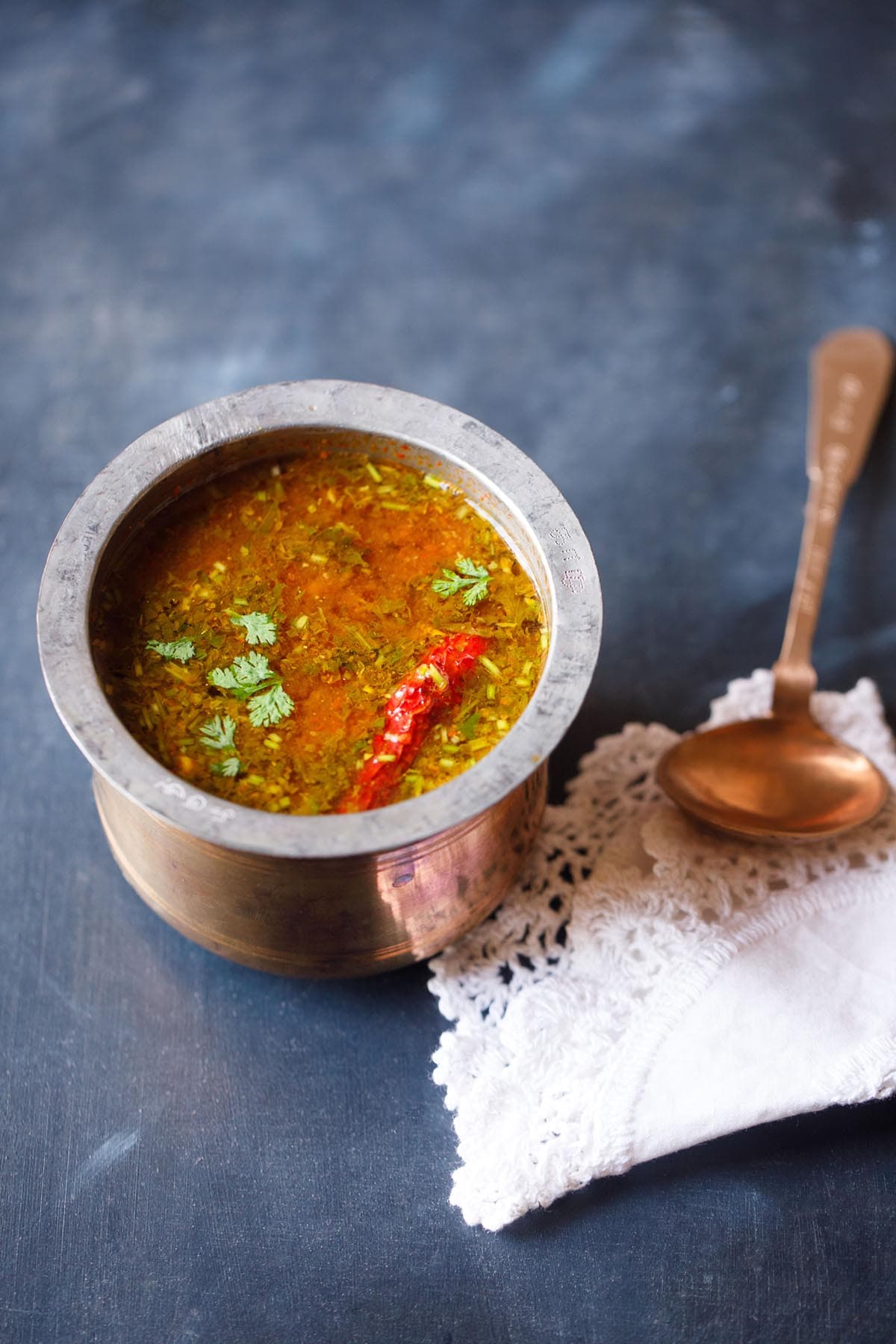
What’s Special About This Tomato Rasam
Tomato Rasam is a popular South Indian soup-like dish that is not just known for its flavors, but also health benefits and a wholesome choice of dish for any meal.
In fact, it’s often served as a spiced hot drink that helps ease cold/cough symptoms and digestion issues.
Since ‘tomato’ is referred to as ‘thakkali’ in Tamil language, this delish piquant rasam version is also known as Thakkali Rasam.
It is a vegan recipe that features juicy tomatoes, bold spices, and lots of ginger and garlic for extra pungent, wonderfully sour notes in the dish.
Table of Contents
Essentially, of the most important ingredients in a rasam preparation is the Rasam Powder.
But like I have mentioned above this recipe of Thakkali Rasam typically doesn’t require any rasam powder in it. There are also no lentils (dal) and tamarind used in this recipe.
While there are many different ways for making a classic Tomato Rasam, this is by far the easiest way to make it from scratch. And, in my opinion, it is the tastiest, too!
This Tomato Rasam or Thakkali Rasam is my mother’s special recipe. It has a more tangyish tomato flavor with a robust taste coming from the spices and herbs. To sum up, it is piquant, tangy with bold and spicy flavors. There’s also a video for this.
The recipe is easy to make and is delectable to enjoy as a soup or with rice. You can also simply choose how spicy you like your rasam.
There are so many ways Tomato Rasam is made in the regional South Indian cuisine. One of our favorites is also this Andhra style Tomato Charu that has the addition of tamarind pulp together with the tomatoes for that extra tang.
Ingredient Essentials
For the Tomato Rasam, we use cumin seeds and black pepper as the main spices. You can increase or decrease the proportion of pepper to adjust with your taste and desired level of spice. Plus, you also obviously require juicy red tomatoes and plenty of herbs.
Other ingredients that are needed are tender coriander stems (cilantro, with or without leaves), ginger and garlic. Again, feel free to use more or less ginger and garlic, depending on how fragrant you want your dish.
How to make Tomato Rasam
Make Herbs & Spice Mixture
1. In a blender or food processor, add ⅓ cup (about a handful) roughly chopped coriander stems (with or without leaves), 7 to 8 medium peeled garlic cloves, and 1 inch peeled and roughly chopped ginger.
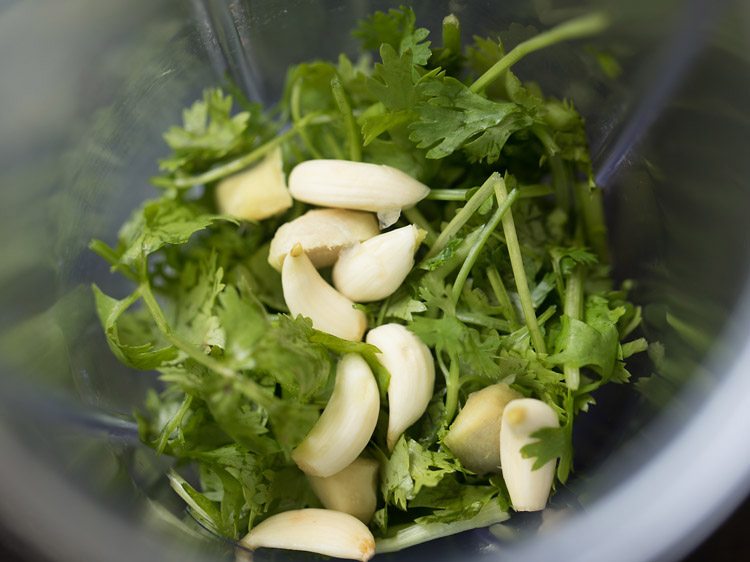
2. Add 2 teaspoons cumin seeds and ¼ teaspoon whole black peppercorns.
Feel free to use less or more pepper to taste.
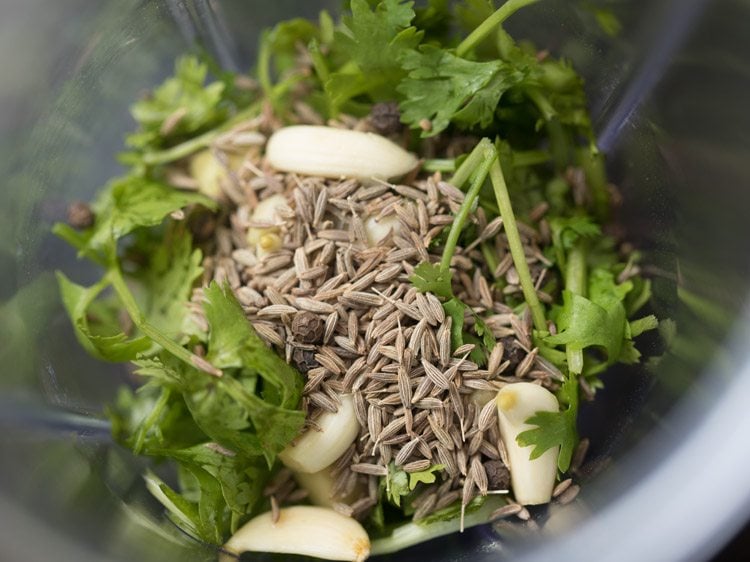
3. Grind to a coarse paste or semi-fine, but do not puree. Transfer the paste to a bowl or plate and keep aside.
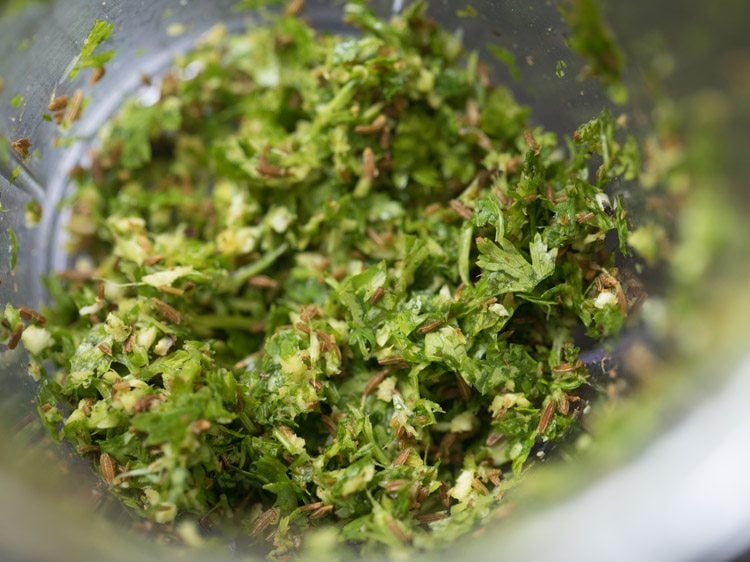
Make Tomato Puree
4. To the same blender, add 3 large ripe and red chopped tomatoes.
You will need 275 grams tomatoes or roughly 1.5 to 1.75 cups chopped tomatoes.
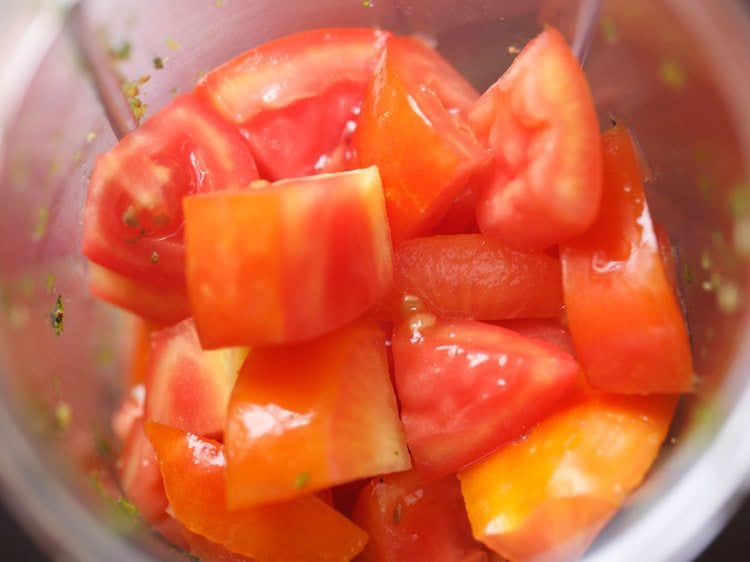
5. Blend the tomatoes to a smooth puree. For a beautiful bright red rasam, you can first blanch the tomatoes and then puree them.
To blanch tomatoes, boil them in a pot of water for 1 to 2 minutes before quickly plunging in a bath of ice water. This stops the cooking process and keeps the tomatoes super red and juicy.
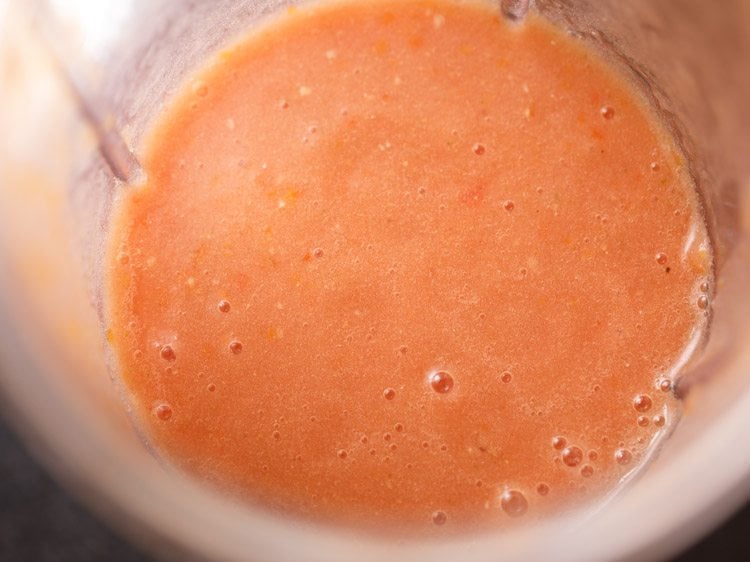
Fry Spices & Herbs
6. First we need to temper the spices in oil, which means frying the spices in hot oil, so that they release their flavors.
To do the tempering, in a heavy pan or pot, heat 2 tablespoons oil on low flame. Add ½ teaspoon mustard seeds.
You can use gingelly oil (made from raw sesame seeds) or sunflower, peanut or any neutral oil.
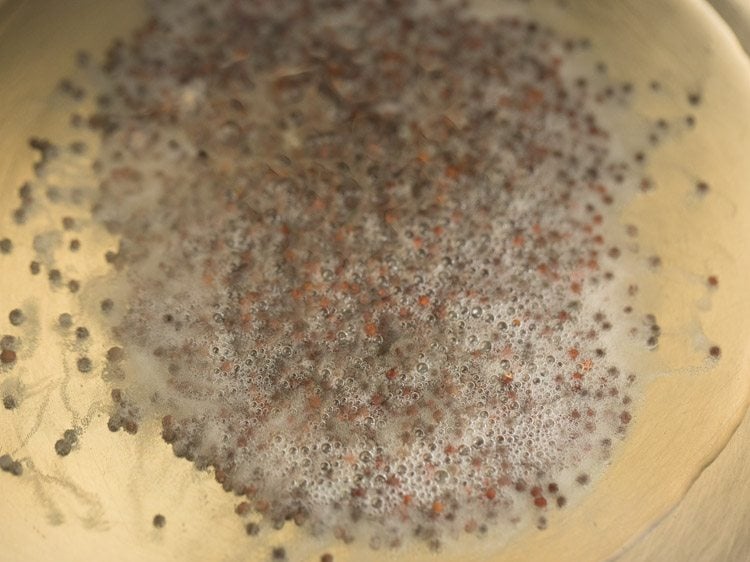
7. Fry the mustard seeds until they begin to crackle.
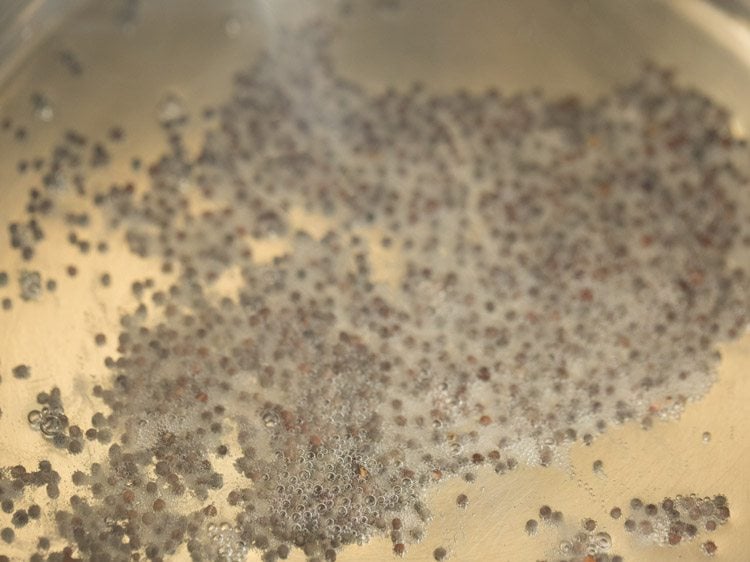
8. Next add ½ teaspoon urad dal.
I have used whole urad dal, but you can even use split and husked lentils.
While the dal adds great texture and taste, feel free to leave it out, if you don’t like or don’t have it.
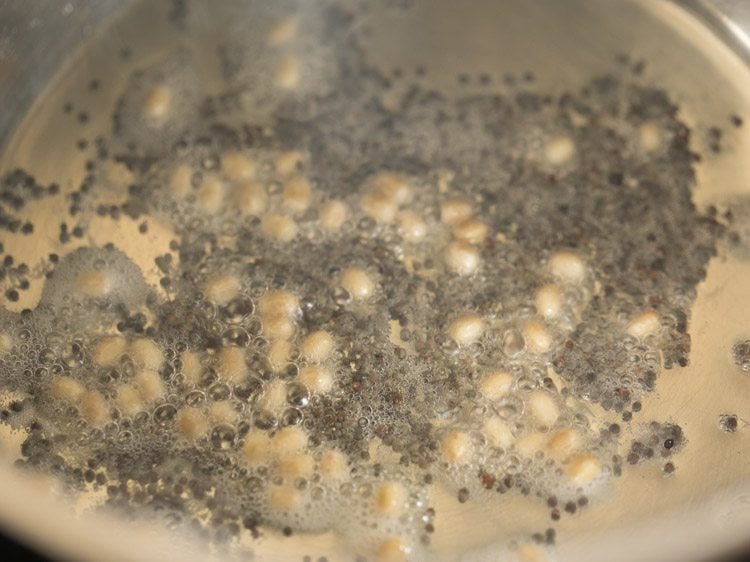
9. Continue to stir often as you fry the urad dal to a golden brown.
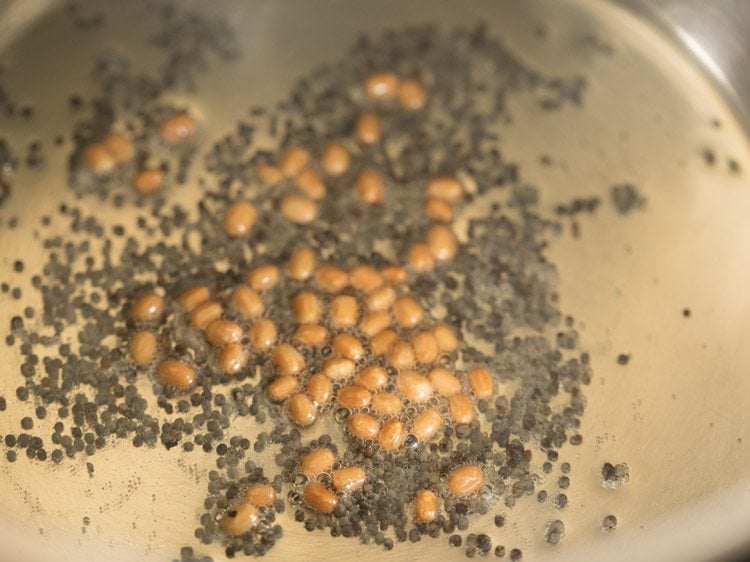
10. Add 1 to 2 dried red chilies (halved and seeds removed) and 1 pinch asafoetida (hing). Turn off the heat, if the pan/pot gets too hot and nearly smokes.
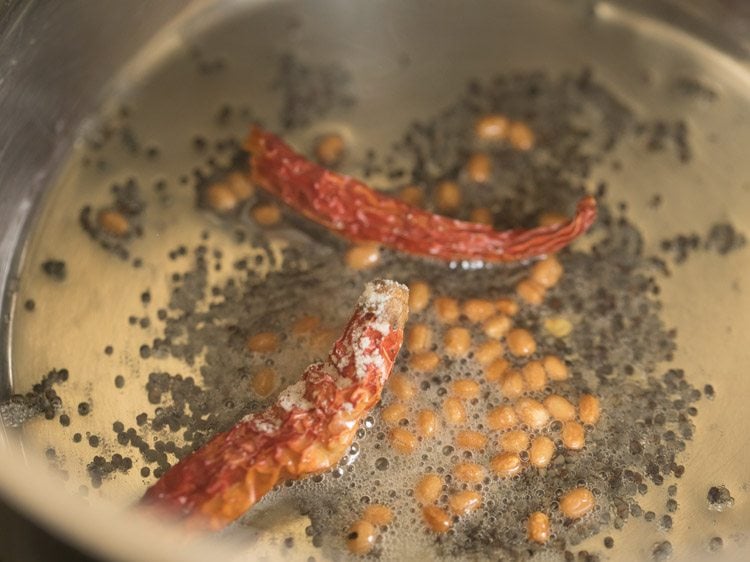
11. Stir and fry the chilies for few seconds or until they start to lose their red color and become reddish brown.
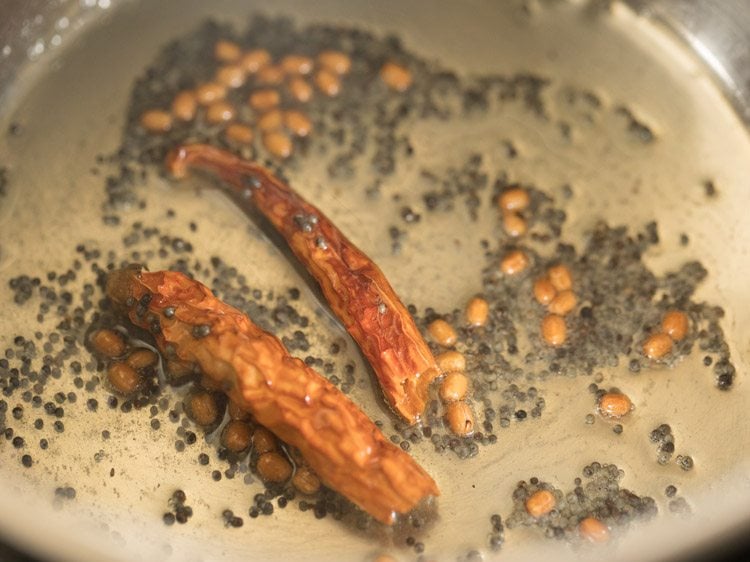
12. Add the prepared spice-herb paste to the pan. Again, if the pan is so hot that anything begins to burn, turn off the heat and/or remove the pan from heat.
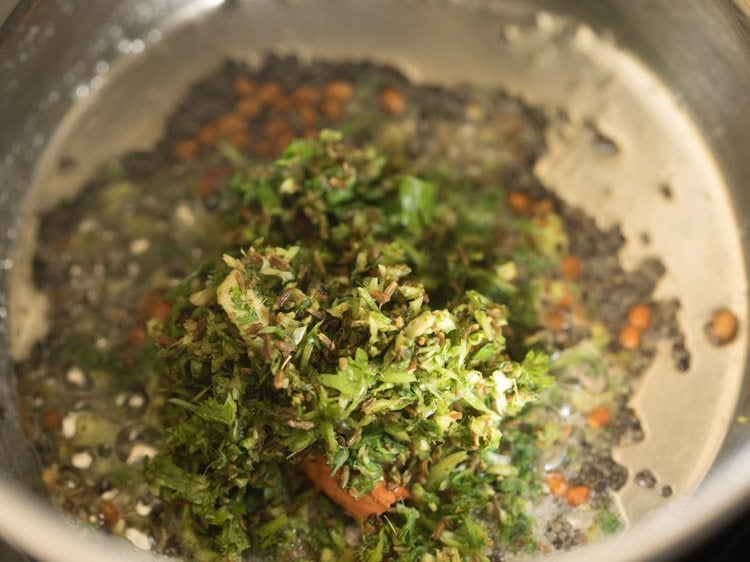
13. Now, add 10 to 12 curry leaves (1 sprig curry leaves), whole or chopped.
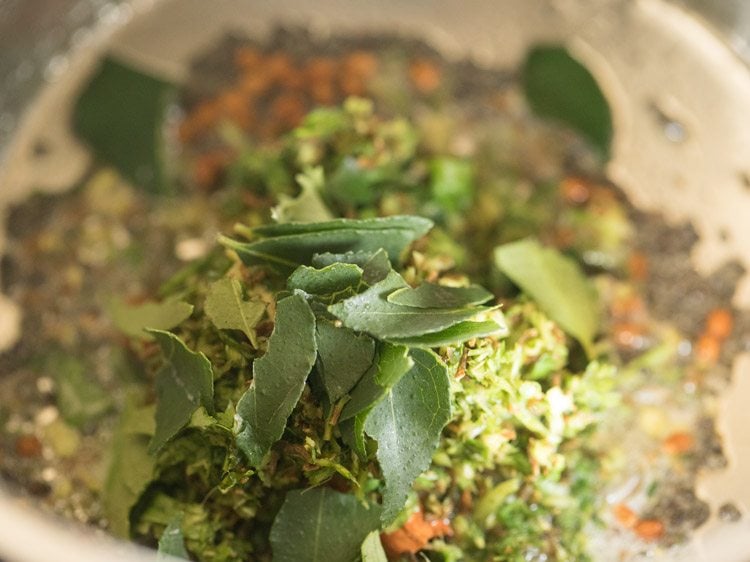
14. Sauté for a minute on low heat, being careful to not burn the spices.
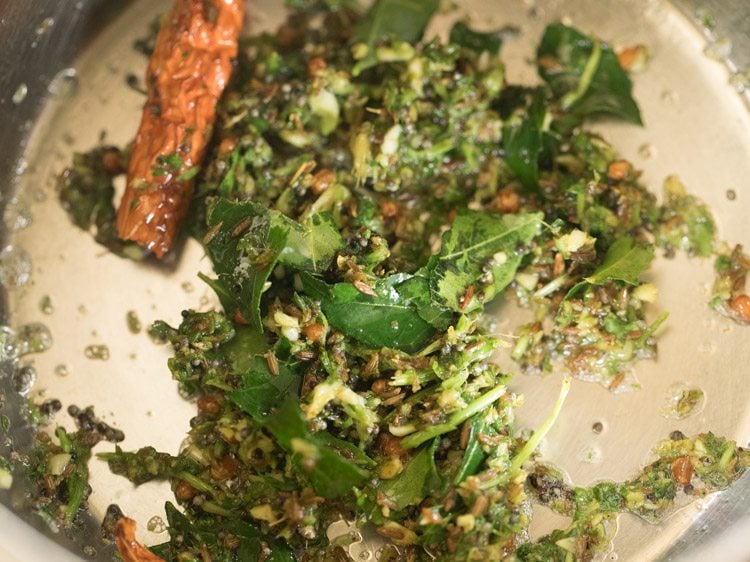
15. Add ¼ teaspoon turmeric powder. At this point you could add about ½ teaspoon of red chilli powder if you prefer.
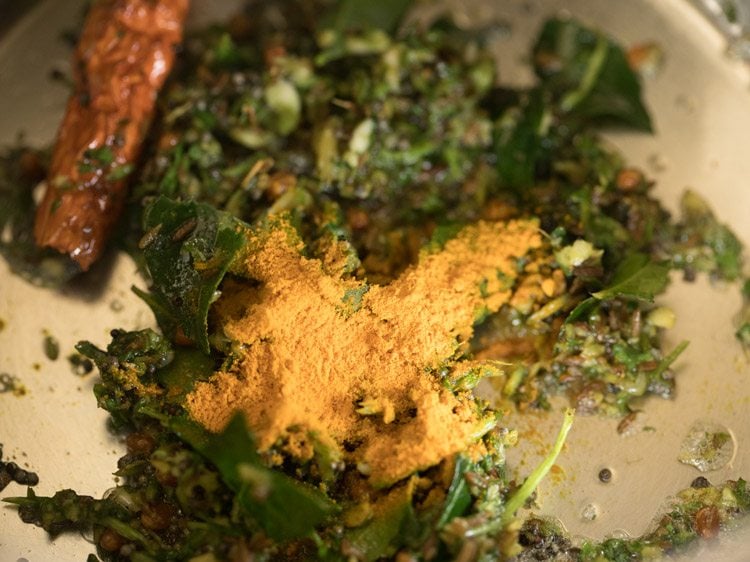
16. Stir to thoroughly blend the turmeric powder with the spice mixture.
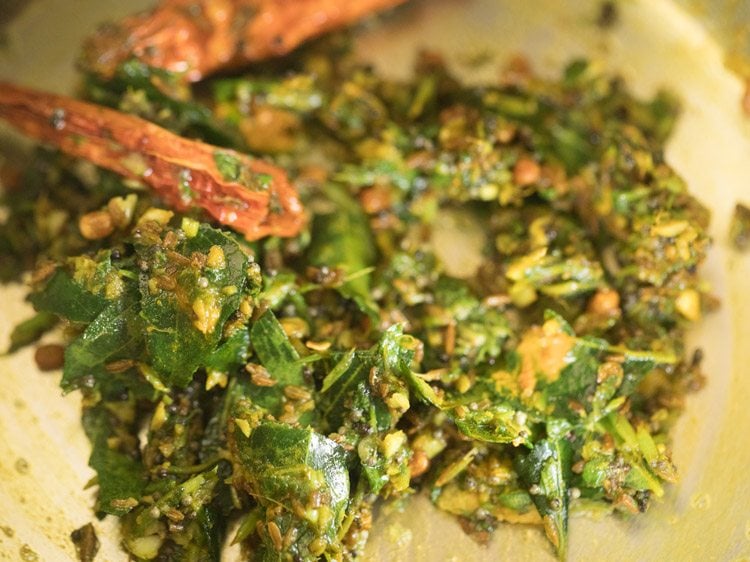
Make Tomato Rasam
17. Carefully, add the prepared tomato puree. Take care as the tempering mixture splutters when you add the tomato puree in the pan.
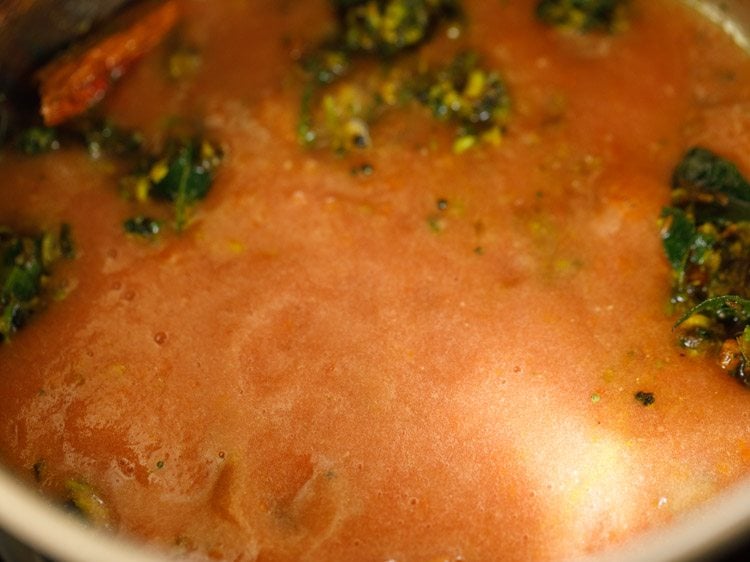
18. Mix well. The rasam will almost immediately smell amazing.
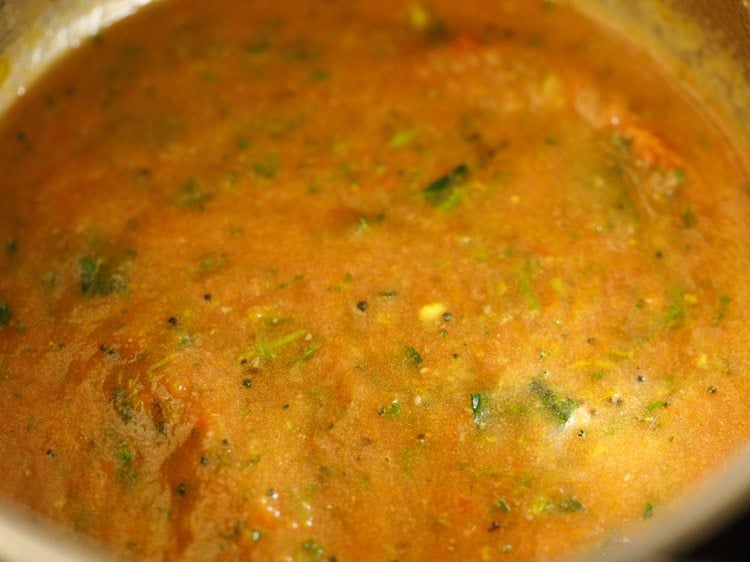
19. Continue to stir and simmer for a minute to heat the mixture through.
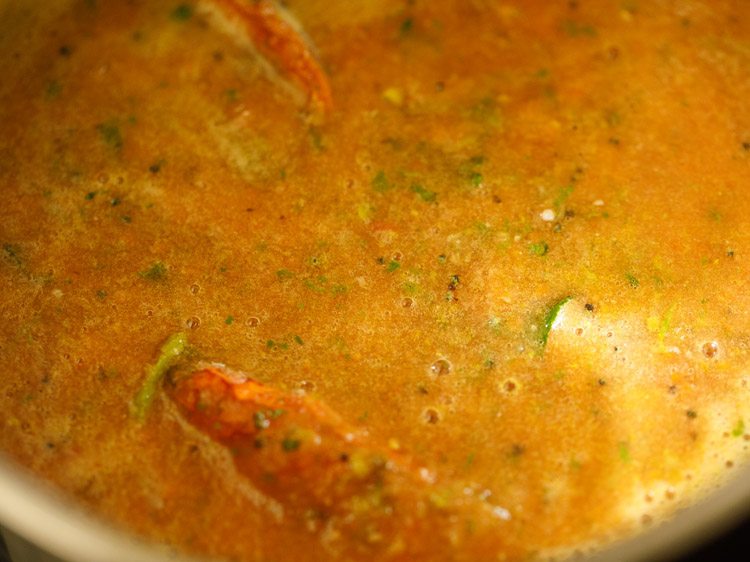
20. Season with salt to taste.
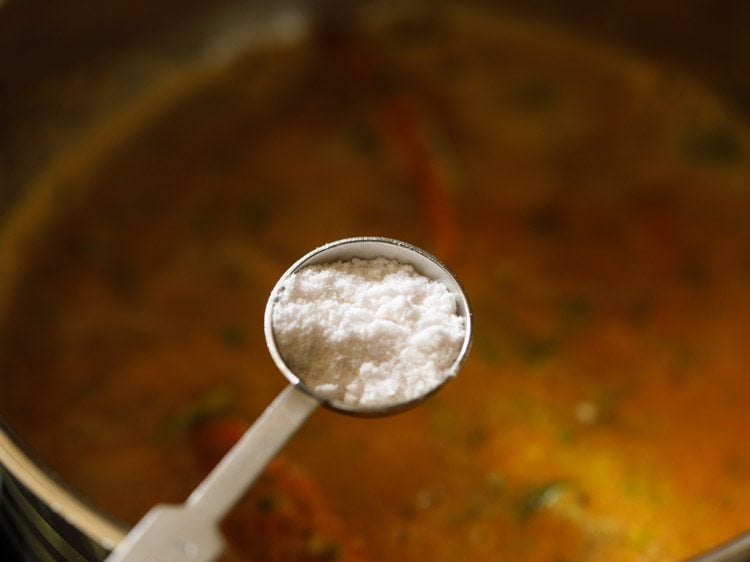
21. Next, add 1.5 cups water and stir to mix.
If you want a thinner rasam, you can add a splash more water. But I don’t recommend adding too much more, or you risk diluting the delicious flavors of the Thakkali Rasam.
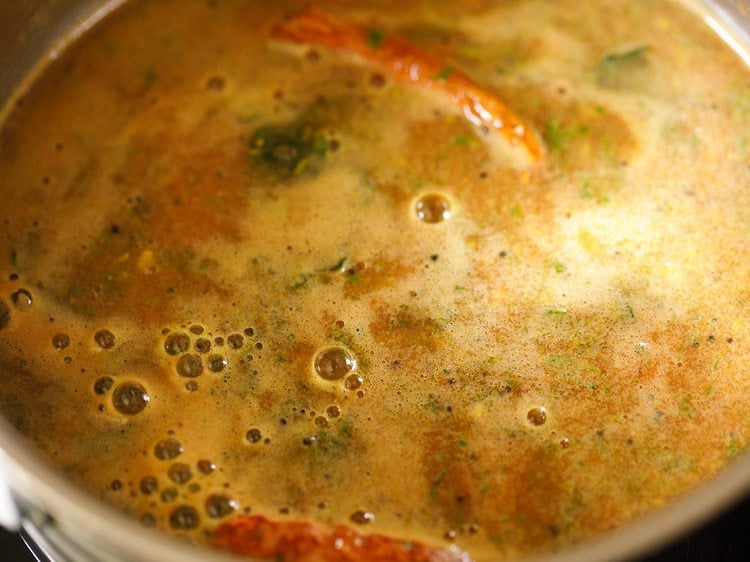
22. Increase the temperature to medium-low heat and bring the rasam to a gently boil. Stir again, and reduce the heat back to low or medium-low.
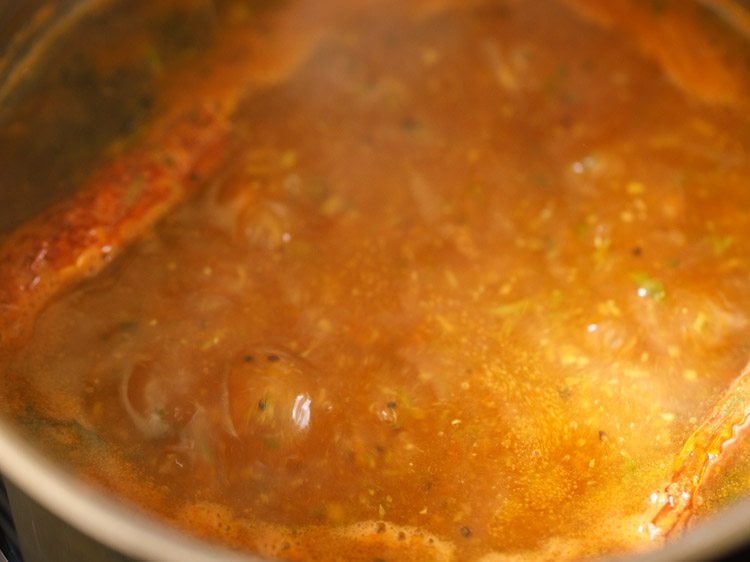
23. Simmer for about 10 minutes, stirring occasionally.
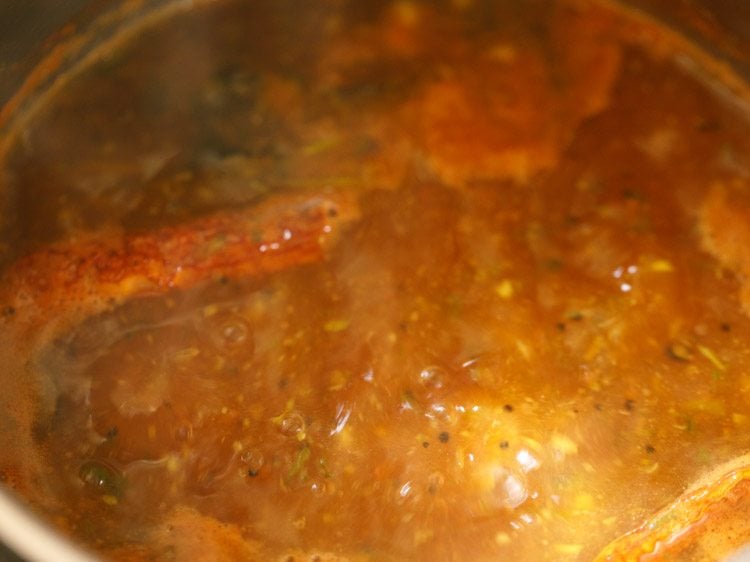
24. Switch off the heat and add 2 to 3 tablespoons chopped coriander leaves. Taste, and add more salt, if needed.
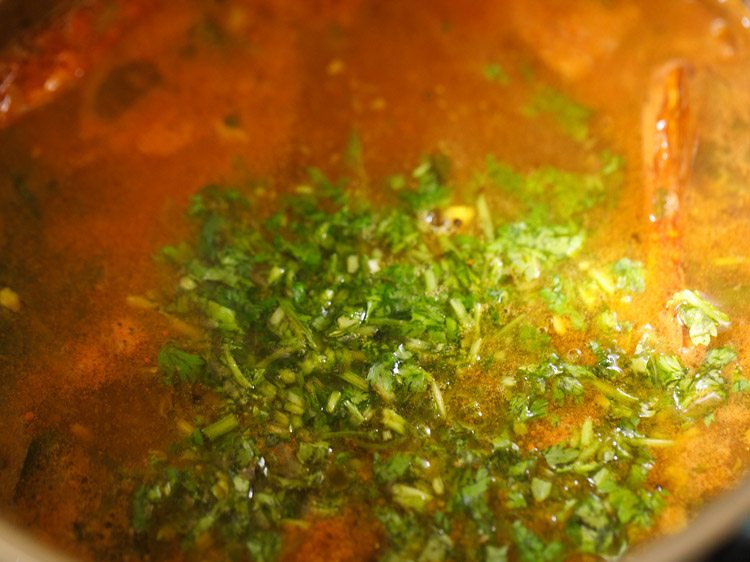
25. Serve Tomato Rasam hot with steamed rice or enjoy as is.
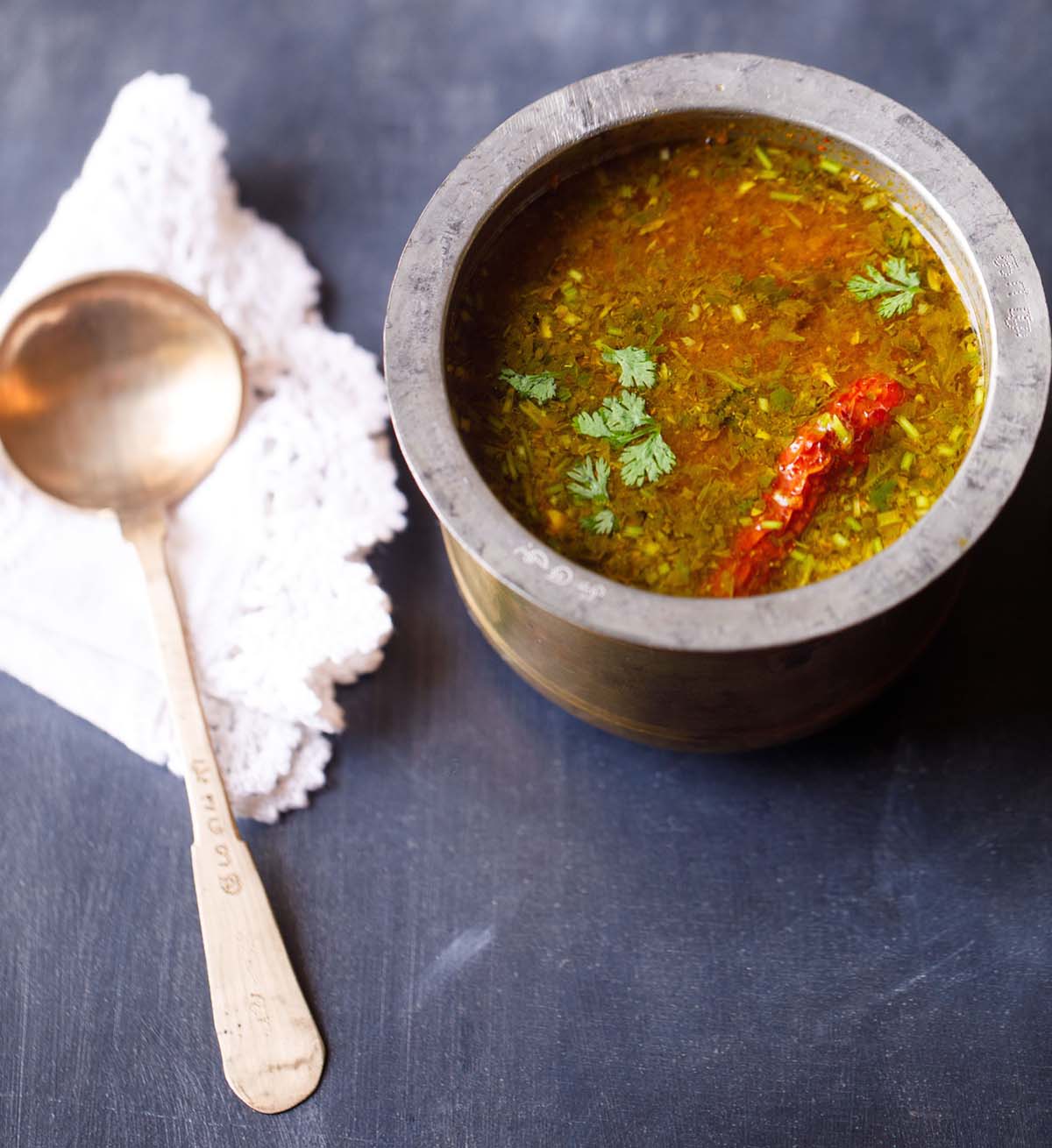
Serving & Storage Suggestions
Tomato Rasam is best had, when served hot, either like a curry over steamed rice or enjoyed as a bowl of hearty soup. Both ways are great with a side of pappadums or simple toasted bread.
If love to pair your Idli or Medu Vada with rasam, go ahead and pair this Tomato Rasam with these popular snacks.
You can refrigerate any leftovers for a day. Reheat the rasam in a small pot or pan until warm or hot. If you plan to make ahead, then do not add coriander leaves. After you reheat rasam, add the coriander leaves.
Expert Tips
- Tomatoes: For the best Tomato Rasam, use fresh, red and ripe tomatoes. You can use any ripe variety of tomatoes in these recipes. For extremely tart tomatoes, you can add some jaggery to balance the sourness.
- Lentil: Skip adding the urad dal in the Thakkali Rasam, if you do not have it.
- Spices: For a spicy and robust Thakkali Rasam, increase the quantity of whole black peppercorns by adding a total of ½ teaspoon.
- Choice of Fat: Traditionally, rasam is made with gingelly oil. It is nothing but wood pressed oil extracted from raw sesame seeds. In a pinch, you can opt to use sunflower oil, peanut oil or any neutral oil.
- Gluten free rasam: To make both these rasam varieties gluten free, skip the asafoetida (hing) or use a gluten free asafoetida in the recipes.
More Rasam Recipes To Try!
South Indian Food
South Indian Food
South Indian Food
South Indian Food
Please be sure to rate the recipe in the recipe card or leave a comment below if you have made it. For more vegetarian inspirations, Sign Up for my emails or follow me on Instagram, Youtube, Facebook, Pinterest or Twitter.
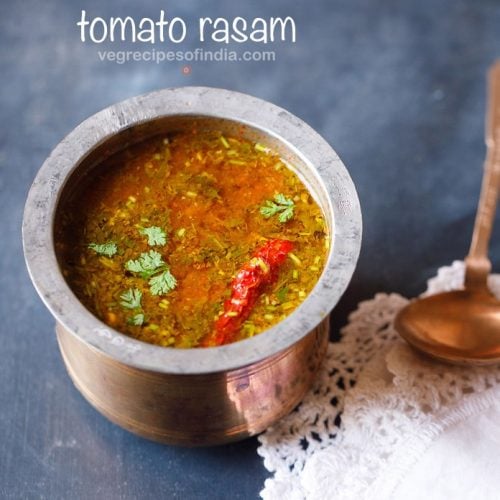
Tomato Rasam (Thakkali Rasam)
Ingredients
For the spice-herb mixture
- ⅓ cup coriander stems – with or without leaves
- 7 to 8 garlic cloves – medium-sized, peeled
- 1 inch ginger – roughly chopped
- 2 teaspoons cumin seeds
- ¼ teaspoon black peppercorns
For tomato puree
- 1.5 to 1.75 cups tomatoes – chopped, 275 grams or 3 large-sized tomatoes
For making tomato rasam
- 1 tablespoon oil – gingelly oil (sesame oil made from raw sesame seeds) or sunflower oil or peanut oil
- ½ teaspoon mustard seeds – black
- ½ teaspoon urad dal – husked, split or husked, whole black gram
- 1 or 2 dry red chillies – broken and seeds removed
- 1 pinch asafoetida (hing)
- 10 to 12 curry leaves or 1 sprig of curry leaves
- ¼ teaspoon turmeric powder (ground turmeric)
- salt as needed
- 1.5 cups water or add as required
- 2 to 3 tablespoons coriander leaves – chopped, (cilantro)
Instructions
Making ground spice & herbs mixture
- Take roughly chopped coriander stems with or without leaves (about a handful of coriander stems) in a blender or mixer jar. Also add the peeled garlic cloves and roughly chopped ginger.
- Add cumin seeds and black peppercorns.
- Grind to a coarse paste or a semi-fine paste. Remove in a separate bowl or plate.
Making tomato puree
- In the same blender add the tomatoes (rinsed and chopped).
- Grind or blend to a smooth puree. If you want, you can blanch tomatoes and then puree them – for a bright red color in the rasam.
Making tomato rasam
- In a heavy pan or pot, heat the oil. Keep the flame to its lowest.
- Add the mustard seed and let them begin to crackle.
- When the mustard seeds start to crackle, then add urad dal.
- Stirring often fry urad dal until they turn golden.
- Now add the dry red chilies (halved and seeds removed) and 1 pinch asafoetida. In case the pan becomes hot, then switch off the heat.
- Stir and fry for a few seconds till the red chilies change color.
- Add the coarsely ground coriander stems+ginger+garlic mixture and curry leaves. If the pan becomes too hot, then you can turn off the heat.
- Sauté for a minute on lowest heat taking care the mixture does not burn. You will get a nice aroma while sautéing this mixture.
- Add turmeric powder and mix it with the rest of the mixture.
- Now add the tomato puree and mix it very well. Take care as the mixture splutters when you add the tomato puree.
- Sauté for a minute. Season with salt as per taste.
- Then add 1.5 cups water. If you like a slightly thinner tomato rasam, then you can add some more water. But do not add too much water as the flavors get diluted.
- Mix well and simmer Thakkali Rasam on medium-low heat until the rasam comes to a simmer.
- Overall simmer for 9 to 10 minutes.
- Finally turn off the heat and add the chopped coriander leaves. Check the taste of tomato rasam and add more salt if needed.
Serving suggestions
- Serve tomato rasam hot, either like a curry over steamed white rice or enjoy as a bowl of hearty soup. Both ways are great with a side of pappadums or a simple toasted bread.
Storage
- Refrigerate any leftovers for a day. Reheat the rasam in a small pot or pan until warm or hot.
- If you plan to make ahead the rasam then do not add coriander leaves. After you reheat rasam, add the coriander leaves.
Video
Notes
- Tomatoes: Tomato rasam is best made with fresh, red, ripe tomatoes. Any variety of red tomatoes work, provided they are ripe.
- Spices: To make the rasam more spicy and robust, increase the amount of black pepper. Add a total of ½ teaspoon whole black peppercorns.
- Oil: Traditionally Tamil nadu style rasam is made with gingelly oil. Gingelly oil is wood pressed oil extracted from raw sesame seeds. In a pinch sunflower oil, peanut oil or any neutral oil also works well.
- Urad dal: If you do not have urad dal, then omit adding them.
- Asafoetida: For a gluten-free rasam do not add asafoetida or use gluten-free asafoetida.
Nutrition Info (Approximate Values)
This Tomato Rasam recipe from the archives was first published on January 2012. It has been updated and republished on May 2024.

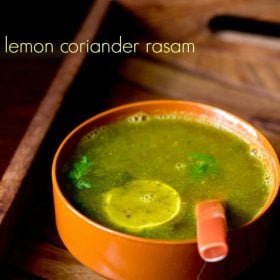
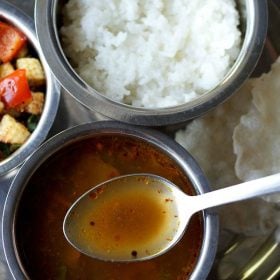
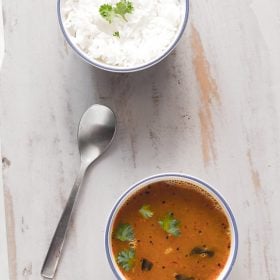
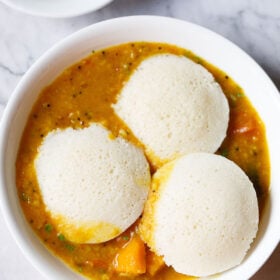

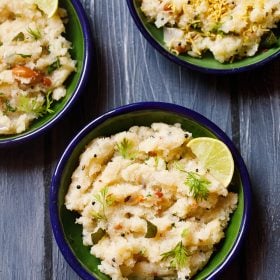
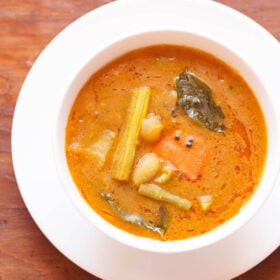








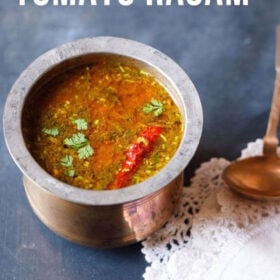
Very tasty
Thank you Dassana. Love the way you present the cooking of vegetarian dishes in your blog. I am big fan of your cooking. Me and my family loved the rasam a lot.
Thanks a lot and so glad to read your comment. Thanks for the rating too on the recipe. Most welcome and happy cooking.
This is absolutely divine !!!! I have tried and made different rasam recipes.. but this one is simply the best and healthy recipes I have come accross. Everyone should try this out. Cheers !!!
Thanks a lot for this super feedback on the recipe. Glad to know.
The best receipes and nicely explained. My family loved the sambaar and rasam. God bless you.
Thanks a lot for your feedback and kind wishes.
sounds delicious 🤩
trying it !!
Easy & good.